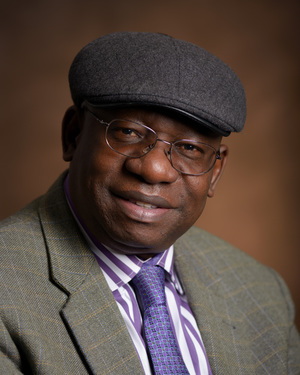Assessment director crunches numbers to measure performance

CHADRON – A self-professed number cruncher, Dr. Bob Adebayo, the new director of assessment at Chadron State College, believes his office is one of the least known on campus.
But, Adebayo said, the job he and his staff perform, which is collecting and analyzing data to find out if the college is fulfilling its mission and meeting its stated goals, is critical and will play a major role in the accreditation process CSC is undergoing next year by the Higher Learning Commission.
“We have to prove that we (CSC) are doing what we say we do and show the data. My job is to provide the data,” said Adebayo, who came to Chadron State about six months ago from a similar position at Missouri Southern State University.
A native of Nigeria, Adebayo earned a bachelor’s degree in sociology from the University of Lethbridge, in Alberta, Canada, and advanced degrees from the University of West Georgia and Kansas State University. He has worked in institutional research and assessment positions for a number of colleges and universities in the U.S. and Canada.
“I like crunching numbers. That’s how I got into assessment,” Adebayo said.
At CSC, Adebayo’s office combines the duties of institutional research, assessment, Tk20, a specialized data management system for education assessment, and accreditation/compliance. Its goal is to measure performance against mission in all aspects of Chadron State College.
Part of CSC’s mission is ensuring that all graduates have certain skills, such as the ability to think critically and analytically, to communicate effectively and to work in groups, Adebayo said. In addition, graduates need skills specific to their majors, he said.
“We want to be sure when they get out of here, they have what they need to be successful in their field,” Adebayo said.
The data for educational assessment comes from a variety of sources. One is the National Survey of Student Engagement (NSSE), which is coordinated by Indiana University and asks students about their experiences at institutions across the country. The 2015 NSSE was completed by 137 CSC graduating seniors and showed 83 percent of them rated their overall experience as excellent or good. Eighty-two percent answered they would definitely or probably choose Chadron State again if they could start their college career over.
That’s a high degree of satisfaction, and compares well with other colleges in CSC’s peer group of similar institutions, Adebayo said.
“That’s a good number,” he said. “Overall, we are doing well compared to our peers.”
Other data for measuring effectiveness comes from sources such as standardized tests in specific subjects, student and faculty evaluations, pass/fail rates in classes, employment surveys of recent graduates and other measures.
Assessment depends on more than a single year of collecting information, Adebayo said, because results must be evaluated over time.
“Assessment has to be ongoing. You make changes to your program and the following year you assess whether the changes are working or not,” he said.
Ongoing assessments are important for every department at CSC, and are part of continuous improvement.
“It’s quality enhancement,” he said. “It’s not something you can do for one year and forget about.”
The assessment data Adebayo assembles will be particularly important as CSC prepares for its accreditation review by the Higher Learning Commission of the North Central Association of Colleges and Schools in April 2017. Achieving full accreditation is critical to educational institutions because it allows students to receive federal financial aid and enables the transfer of credits to other institutions, said Adebayo.
“If we are not accredited, the students won’t come,” he said. “People really need to know the importance of accreditation.”
Accreditation takes place on a 10-year cycle, Adebayo noted, and Chadron State was last accredited in 2007. The visiting HLC accreditation team will be looking at all aspects of college operations, including formal educational activities, governance, student learning, financial stability, admissions and student services, among others. Assessment data will be used to support the accreditation report.
One of Adebayo’s goals is to build a culture of assessment at CSC. That will not only streamline the accreditation process, but also assist in strategic planning and make academic and institutional programs more effective, he said.
Another aim is to make the Tk20 software the central repository for all of the college’s assessment data.
“Instead of going all over the place, you have a central location,” he said.
Assessment may sound like a dry subject, but Adebayo said he likes developing the methodology and ongoing processes that help the college fulfill its mission.
Adebayo’s love of numbers makes the job even more rewarding.
“I liked to play with numbers even when I was growing up,” he said. “Numbers don’t talk. You have to speak for them, to explain what they mean.”
Category: Campus News, Employee Awards & Achievements
